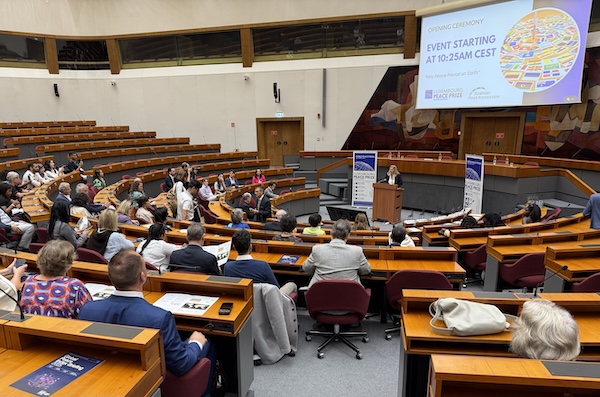 Credit: Ievgenii Karanov, Chronicle.lu
Credit: Ievgenii Karanov, Chronicle.lu
On Friday 27 June 2025, the Schengen Peace Foundation held the thirteenth edition of the Luxembourg Peace Prize at the Hémicycle in Luxembourg-Kirchberg.
The event brought together peacemakers from around the world for an official ceremony recognising Luxembourg Peace Prize laureates. It began with the inaugural World Peace Flag Mandala activity, led by Patrick Petit Uwe of the Goi Peace Foundation. Around 100 participants took part in the ceremony, which involved placing national flags on the floor in a circular arrangement while stating: “May peace prevail in [country].” The symbolic gesture aimed to promote global unity and served as a moment of reflection on ongoing conflicts worldwide.
In her opening speech, Vicki Hansen, President of the Schengen Peace Foundation and Luxembourg Peace Prize, highlighted the importance of understanding and measuring peace: “If we have a goal of peace and we want to be serious about that, then we need to measure it and understand its components.” She also acknowledged the longstanding partnership with the Institute for Economics and Peace, whose founder received the award for Outstanding Peace Technology a decade ago. She then invited IEP Chief Research Officer, Thomas Morgan, to the stage to present the Global Peace Index 2024/2025 report.
The presentation highlighted four key findings from this year’s report. According to the data, global peacefulness declined by 0.36%, with 87 countries experiencing deterioration and 74 showing improvement, continuing a two-decade trend. “It is the thirteenth year in the last seventeen where peacefulness has deteriorated,” noted presenter Thomas Morgan. The ten most peaceful countries remain concentrated in Western and Central Europe, alongside Singapore and New Zealand.
Another key point from the report was the rise in external involvement in conflicts: in 2023, 98 countries were engaged in conflict beyond their borders, up from 51 in 2008. “That’s been the biggest negative change,” noted Thomas Morgan.
The presentation also addressed the broader global context, highlighting growing geopolitical fragmentation, asymmetric warfare and institutional shortcomings. “It’s undeniable that the world is entering a polycrisis era,” Morgan stated.
Despite these challenges, he pointed to new opportunities for peacebuilding. Countries not traditionally involved in conflict mediation, such as Indonesia and some Gulf states, are increasingly playing active roles. “Even in a period where you have weakening traditional international institutions, there are new avenues opening up,” he concluded.
The event continued with a musical interlude offered by the “Carano 4 Children Foundation”, which manages the “Leonardo 4 Children” initiative for climate equality and peace. Alexandra Chepurenko of the Brussels International Music Academy (BRIMA) performed “Ode to Joy” by Ludwig van Beethoven.
The official Luxembourg Peace Prize award presentations then began, starting with the Outstanding Environmental Peace category. The 2025 laureate was Tony Rinaudo from Australia, recognised for developing the farmer-managed natural regeneration (FMNR) concept, a simple, low-cost method enabling farmers to restore degraded land by encouraging the natural growth of existing trees. Today, FMNR is being used in more than 25 countries.
In the Outstanding Peace Journalism category, the award went to Gloria Laker Adiiki Aciro from Uganda. As Founder and Director of the Peace Journalism Foundation (PJF), she has devoted her career to training more than 800 journalists in conflict-sensitive reporting, with a “strong emphasis on peacebuilding narratives and inclusive storytelling.”
The Outstanding Peace Activist award was presented to World Central Kitchen (USA). Through the leadership of Founder and Executive Director Chef José Andrés, the organisation has built Chefs for the World, a “global network of culinary professionals dedicated to providing fresh, chef-prepared meals in the immediate aftermath of natural disasters and humanitarian crises.”
The Outstanding Peace Process award was presented to Dror Rubin (Israel) and Ghardir Hani (Palestine) for their involvement in Constituencies for Peace, an interfaith dialogue initiative aimed at addressing tensions between Muslim and Jewish communities in Israel.
The Outstanding Peace Support award was given to Chiche! (Luxembourg), a restaurant chain that employs refugees and fosters cultural exchange through its operations.
The Outstanding Peace Activism award went to Jennifer Teege (Germany), a New York Times bestselling author involved in various peace-related initiatives, including the Flame of Hope project and the Glastonbury Festival.
Anne-Marie Voorhoeve, Co-founder of The Hague Center for Global Governance, Innovation and Emergence, made an official announcement of the 2025 World Peace Forum on behalf of the South Africa team. The event concluded with a World Peace Prayer and Metta Bhavana (Loving-Kindness Meditation).








